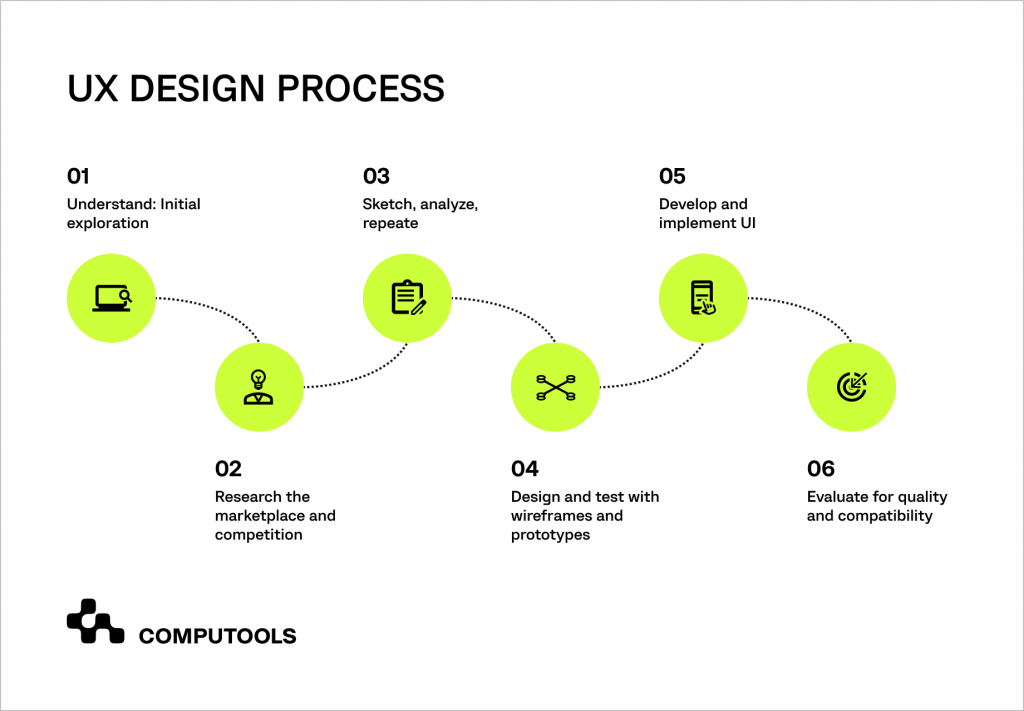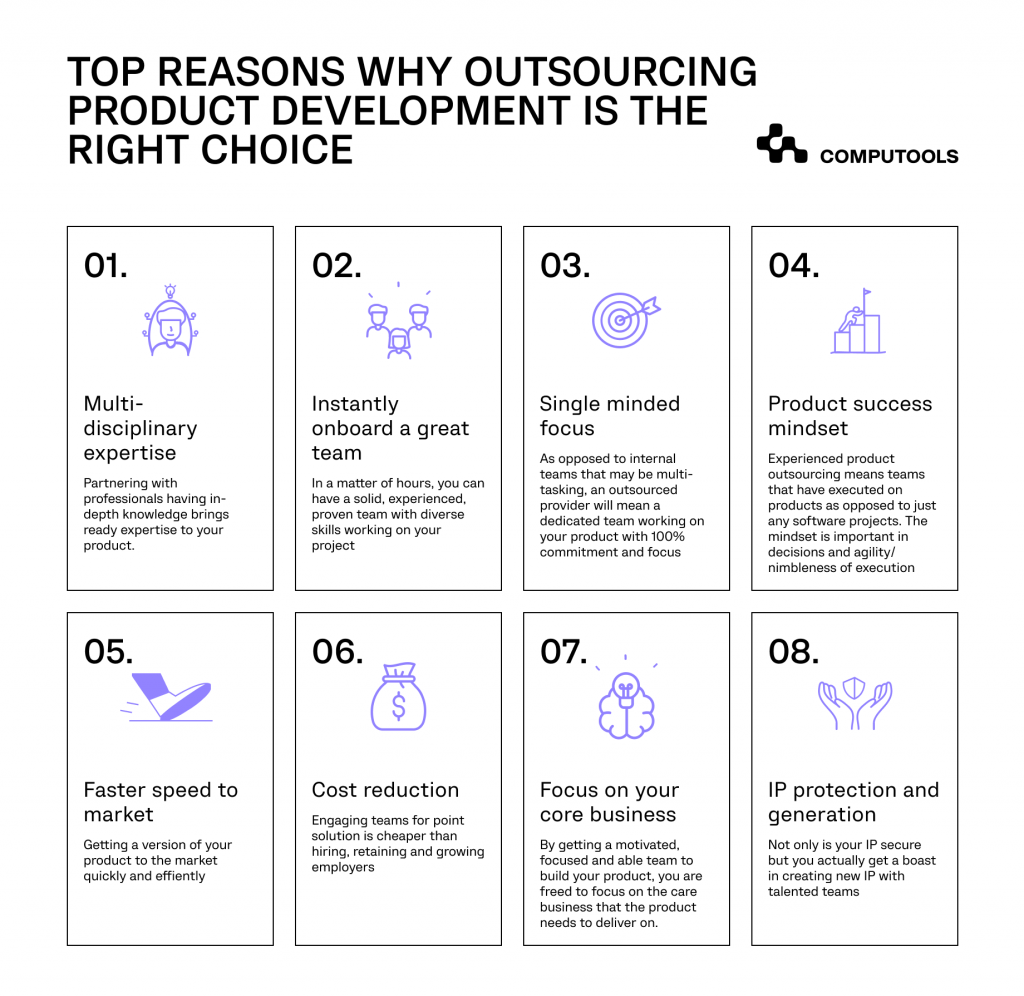As business activities increasingly shift online, prioritising an excellent user experience, also known as UX design, becomes highly important.
Despite some entrepreneurs underestimating the significance of UX, it plays a substantial role in a company’s financial performance. Spiralytics highlights that, following a positive user experience, 72% of customers are likely to recommend your brand to six other people.
The decision to outsource UX design is a big one, often accompanied by concerns about the associated financial and time investments.
However, contrary to these apprehensions, outsourcing can be a solution that saves both resources. A specialised design team can assist your in-house workers in saving time and focusing on other business tasks.
Additionally, a Forrester Research report found that, on average, for every dollar invested in UX, there’s an impressive return of $100, resulting in an outstanding ROI of 9,900%. Quite impressive, isn’t it?
In this article, we will further discuss the benefits of design services, highlighting key reasons why outsourcing this business task might be a wise choice.
Why Is UX Design Important for Businesses?
As previously mentioned, UX helps businesses increase profit, but its advantages extend beyond financial gains.
UX design is not just about the visual aspects linked to UI services: it profoundly shapes how users interact with products. This plays a huge role in achieving success in today’s highly competitive market.
The UX design process begins with concept development, where we integrate competitor analysis and define the needs and problems of the target audience.

A well-thought-out design concept aligns the product with the brand’s identity and values end-user expectations, establishing the groundwork for a product that resonates with users, builds brand loyalty and ensures positive interactions.
Another key to business growth through UX design is a comprehensive analysis of competitors. By understanding their strengths and weaknesses, companies can strategically position themselves, identifying market gaps or areas where competitors fall short in user experience to provide better products and gain a competitive edge.
Investing in UX design outsourcing is also an investment in understanding the target audience. Specialists delve into user preferences and pain points, empowering businesses to tailor their products to meet specific needs.
This user-centric approach not only improves customer satisfaction but also contributes to increased user retention and positive word-of-mouth marketing.
Furthermore, in UX design, collecting user feedback and making ongoing improvements involve utilising user analytics to understand user behaviour. Employing this data-driven approach helps business owners to make well-informed decisions.
While user interface design is integral to user experience, UX encompasses the entire user journey, from the initial interaction to sustained engagement.
By prioritising the overall user experience, businesses can create products that are intuitive, efficient and enjoyable to use, maintaining user engagement over time.

Top 8 Reasons To Outsource UX Design
1. Benefit from external expertise
Collaborating with an outsourced team opens the door for companies to tap into a rich pool of UX specialists. An external team offers a unique advantage in fostering a more creative mindset.
With a fresh perspective and distance from the project, external specialists can discern necessary changes and offer innovative insights, avoiding fixation on pre-existing ideas.
For SMEs, outsourcing goes beyond technical skills, offering subject matter expertise and tools to create innovative solutions for diverse industries and audiences.
Similarly, enterprises benefit from outsourcing as it injects new ideas, aiding in keeping the brand identity up to date.
Also, working alongside an external UX team allows continuous learning. Businesses can adopt established processes and best practices from the outsourcing partner, applying them directly or adapting them to better suit their specific needs.
2. Enhance scalability for varying workloads
Opting for a do-it-yourself approach in UX design has its challenges, especially when it comes to team management. If your internal staff is not enough, you might face delays in getting results.
Having too many team members can use up resources without a guaranteed improvement in outcomes. Moreover, adapting to evolving project needs can be a struggle.
UX outsourcing is a practical solution, particularly when dealing with variable workloads. It makes handling fluctuating workloads effortless for SMEs, enabling them to adjust UX design efforts based on project demands without the need to manage a large in-house team.
For enterprises, outsourcing ensures they actively benefit from efficient project management. Companies seamlessly scale UX teams based on variable workloads, improving operational flexibility.
As a rule, external teams show a remarkable ability to adapt quickly and allocate resources strategically, aligning with different stages of project development.
3. Improve efficiency and accountability
Efficiency in UX design is best achieved when it’s seamlessly integrated into the same team responsible for building custom software. The benefits of this approach are evident – a unified team reduces the necessity for code rewrites and extensive iterations among different teams, resulting in significant time and cost savings.
On the other hand, choosing to outsource UX design brings about an increased level of accountability between the business and the Software Engineering team.
This outsourcing model promotes robust communication and collaboration, ensuring both entities work closely together to produce an exceptional final product.
Collaborative synergy contributes to a more streamlined development process, yielding a product that not only meets but potentially exceeds expectations.
4. Decrease risk factors
In UX design, errors are a common concern, regardless of who’s handling the job. However, if you’ve managed to find the right UI/UX design agency, the impact of these errors significantly diminishes.
Navigating resource constraints, SMEs often benefit the most from partnering with a UX agency, as it ensures a seamless and error-free UX, even within tight schedules. Investing in an inefficient in-house UX team can result in substantial expenses on testing and debugging.
However, vendors, particularly those adopting a fixed-price model, provide a solution to help businesses steer clear of unpredictable spending.
5. Speed up time to market
Global outsourcing partners often operate in different time zones. This geographical diversity allows for round-the-clock productivity. While one team wraps up their workday, another team in a different location can seamlessly continue the design process, ensuring continuous progress towards project completion.
Also, outsourcing firms are equipped with streamlined workflows and tools and can swiftly create prototypes for user testing.
Rapid adjustments based on user feedback can reduce the time spent on lengthy redesign cycles. This agile approach guarantees that the final product aligns closely with user expectations.
6. Reduce costs
For small and medium businesses, cost-effectiveness is a key benefit when choosing UX outsourcing. By engaging a UX agency, you pay for a specific amount of work over a set period, avoiding hidden charges.
Outsourcing provides SMEs with a straightforward and transparent cost structure. This means that businesses pay a clear fee for a specific amount of work within an agreed-upon time frame, minimising unexpected expenses. This uncomplicated approach ensures businesses only pay for the services they need.
It’s important to understand the agency’s service offerings and pricing model to avoid surprises. For instance, when a business is developing a mobile app, it should clarify whether services like user testing and revisions are included in the UX design package or billed separately.
In essence, by outsourcing, businesses gain a clear and manageable approach to controlling expenses.
7. Focus on the core business tasks
Not all businesses are set up to handle internal UX design. Hiring and training dedicated UX designers is a substantial commitment that demands both time and resources, potentially taking focus away from other critical areas of your business.
User experience design outsourcing is a smart alternative. This approach allows businesses to reclaim time and concentrate on core business tasks.
With outsourcing, small and medium businesses can efficiently handle limited human resources and enterprises may improve resource distribution within a large operational framework.
Overall, outsourcing simplifies the design process, ensuring that your business operates smoothly and can work on its core strengths without the hassle of managing an in-house design team.
8. Utilise advanced technology
In the dynamic field of UX design, staying on top of trends like Angular, Node.js and React demands considerable time and effort for internal teams.
Outsourcing presents a practical solution, letting SMEs and larger businesses tap into expertise proficient in vital UX trends such as voice interfaces, 3D graphics and interactive storytelling.
This is especially beneficial for businesses not specialised in these areas, freeing them from the challenge of staying constantly updated.
For companies lacking a dedicated UX specialist, UX design outsourcing is a smart choice. Meanwhile, those with a small team can enhance their capabilities through staff augmentation, ensuring a comprehensive and efficient approach to the entire UX job.

Computools
Software Solutions
Computools is an IT consulting and software engineering company that delivers innovative solutions to help businesses unlock tomorrow. Our clients represent a wide range of industries, including retail, logistics, finance, healthcare, and others.
UX Design Outsourcing vs In-House Experts: Which Is Better?
Choosing between in-house design teams and outsourcing involves critical considerations. A thorough assessment of these factors ensures a decision aligned with company goals and resources.
For immediate responsiveness, budget predictability, cultural alignment and long-term dedication, opt for in-house designers, especially, if you:
– need to adhere to a defined budget with predictable ongoing costs.
– require quick responses for design changes, updates or last-minute projects.
– have a consistent and ongoing need for specific design work tied to local peculiarities or traditions.
To address hiring challenges and unlock various opportunities, consider outsourcing. It will best suit businesses that:
– require specialised design skills not available in-house, such as UX/UI design services.
– face resource constraints with a stretched in-house design team or a limited number of designers.
– aim to reduce overhead costs associated with maintaining an in-house design team.
Recognise that each situation may demand a unique approach for more efficient operations and better outcomes. You can also enjoy the flexibility of not being confined to a single option. Scale up your in-house team by partnering with a design agency. This hybrid model combines the benefits of both, bringing diversity and fresh ideas to your projects while ensuring efficiency.
Conclusion
Effective UX design holds significant value for businesses, as it directly impacts customer satisfaction. While it may not single-handedly guarantee business success, it still plays a big role in attracting leads and creating new opportunities.
To truly prioritise UX, consider seeking assistance from UX design specialists. Their expertise ensures that your human-centred design is not just functional but also resonates positively with your audience, enhancing customer satisfaction and, in turn, contributing to the overall success and growth of your business.
Elevate your business by experiencing the substantial benefits of top-notch software and UX development by reaching out to us via email at info@computuls.com.









“Computools was selected through an RFP process. They were shortlisted and selected from between 5 other suppliers. Computools has worked thoroughly and timely to solve all security issues and launch as agreed. Their expertise is impressive.”